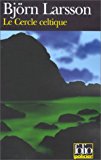
Le cercle celtique PDF
Preview Le cercle celtique
A best-seller in Europe, Larsson's thriller is a homage to Erskine Childers' amateur-yachtsman-turned-spy classic, The Riddle of the Sands (1903). For Larsson, the reluctant heroes are two Swedes, Ulf and Torben, who encounter an enigmatic Finn, Pekka, who before his demise reveals the existence of something called the Celtic Ring. Driven by curiosity, masochism, and justice, the two sail across the North Sea in the dead of winter, surviving, besides the voyage, encounters with several homicidal persons. They discover a vast Celtic underground, encompassing but not limited to a revived Druidism and dedicated to the autonomy of Scotland, Ireland, Wales, and Brittany. The intrigues and betrayals of Larsson's yarn are complex and sometimes implausible, but brisk action, plenty of splendid nautical detail, and gripping scenes of peril at sea make it high-interest fare for lovers of tales of the salt. Roland Green
ReviewIn the 1990s, a sailor hands his logbook to a Swede named Ulf living on his sloop in Denmark, then disappears. Log entries hint of a Druid revival, with allusions to Scotland s Caledonian Canal and a grisly cult. Ulf wants answers and asks friend Torben, a Celt/IRA buff, to join him on a Scotland cruise to get them, but doesn t reveal his motive. Sound familiar? Translated from Swedish, this is a fine cruising yarn in which The Riddle of the Sands is a clue. --Cruising World, February 2002[HTML_REMOVED][HTML_REMOVED]A Swedish yacht owner stumbles into a Celtic plot for worldwide self-sovereignty in The Celtic Ring, a craggy, atmospheric thriller by Swedish writer and sailor Bjorn Larsson. After a meeting with an excitable Scotsman, Ulf, a solitary middle-aged man living on board his yacht, the RUSTICA, embarks on an adventure that takes him on a wild winter sail across the North Sea. Though a bit sluggish in the water, Larsson s novel is thoroughly steeped in seafaring lore, and will be of particular interest to sailors and Celtic history buffs. Trans. from the Swedish by George Simpson. --Publisher's Weekly, November 2000[HTML_REMOVED][HTML_REMOVED]A dark thriller of modern day Druids, gruesome Celtic rituals, arms smuggling and nail-biting sailing in some of the most dangerous waters in the world.
The story, which is concerned mainly with efforts to maintain independence for the Celtic followers of Brittany, Wales, Scotland and Ireland, takes us on a quest across the North Sea in a 31-ft yacht in the middle of the winter!
The reader is kept avidly turning pages to discover what lies behind the attempts on the lives of the two intrepid Swedish sailors who have unwittingly found themselves involved in a series of bizarre events.
The book has won critical acclaim in Europe and I can understand why. Apart from providing a riveting tale, I learned much about the ancient and enigmatic Celts and their strange beliefs, some of which endure to the present day. --Sailing S.A., February 2002
A Swedish yacht owner stumbles into a Celtic plot for worldwide self-sovereignty in The Celtic Ring, a craggy, atmospheric thriller by Swedish writer and sailor Bjorn Larsson. After a meeting with an excitable Scotsman, Ulf, a solitary middle-aged man living on board his yacht, the RUSTICA, embarks on an adventure that takes him on a wild winter sail across the North Sea. Though a bit sluggish in the water, Larsson s novel is thoroughly steeped in seafaring lore, and will be of particular interest to sailors and Celtic history buffs. Trans. from the Swedish by George Simpson. --Publisher's Weekly, November 2000
A dark thriller of modern day Druids, gruesome Celtic rituals, arms smuggling and nail-biting sailing in some of the most dangerous waters in the world.
The story, which is concerned mainly with efforts to maintain independence for the Celtic followers of Brittany, Wales, Scotland and Ireland, takes us on a quest across the North Sea in a 31-ft yacht in the middle of the winter!
The reader is kept avidly turning pages to discover what lies behind the attempts on the lives of the two intrepid Swedish sailors who have unwittingly found themselves involved in a series of bizarre events.
The book has won critical acclaim in Europe and I can understand why. Apart from providing a riveting tale, I learned much about the ancient and enigmatic Celts and their strange beliefs, some of which endure to the present day. --Sailing S.A., February 2002
